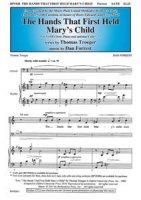We're singing this lovely anthem for our Christmas Lessons & Carols service.
The Hands that First Held Mary's Child (Thomas Troeger and Dan Forrest, Beckenhorst Press, BP1928)
The hands that first held Mary's child were hard from working wood.
From boards they sawed and planed and filed and splinters they withstood.
This day they gripped no tool of steel, they drove no iron nail,
but cradled from the head to heel our Lord, newborn and frail.
When Joseph marveled at the size of that small breathing frame,
and gazed upon those bright new eyes and spoke the infant's name,
the angel's words he once had dreamed poured down from heaven's height,
and like the host of stars that beamed blessed earth with welcome light.
"This child shall be Emmanuel, not God upon the throne,
but God with us, Emmanuel, as close as blood and bone."
The tiny form in Joseph's palms confirmed what he had heard,
and from his heart rose hymns and psalms for heaven's human word.
The tools that Joseph laid aside a mob would later lift
and use with anger, fear, and pride to crucify God's gift.
Let us, O Lord, not only hold the child who's born today,
but charged with faith may we be bold to follow in His way.
At first, I was a litte put off by the words. Questions of logic kept getting in the way.
Did Joseph really have steel tools? I looked that one up, and he certainly could have; steel had been invented long before. But was it common enough for an impoverished carpenter in Palestine to be using steet tools? That I couldn't easily determine.
Were Joseph's really the first hands to hold Jesus? This provoked quite a lot of comment from the women in our choir. We're talking more than 2000 years ago. Did men really act as midwives back then? I would guess only if absolutely necessary and they wouldn't have had a clue in any case. If Mary (wtih no experience) managed the birth herself, it's her hands that would have caught the baby. But how likely is it that in a very crowded Bethlehem there couldn't be found a midwife, or at least an experienced mother, to assist Mary when the birth pangs began? That a firstborn son should have been laid in the putative father's hands does not stretch the imagination, but that he was first? I'm skeptical.
Fortunately, our choir director is patient, and we just kept practicing the anthem. Lo and behold, I started to find it very moving. I finally recognized it for what it is: not literal, but symbolic. Symbolic hymns were once a lot more common, and modern folks generally think they're weird, e.g. the Christmas carol, I Saw Three Ships. But they can be very powerful.
I'm reminded of another, hauntingly beautiful, symbolic anthem that our children's choir sang many years ago.
A Legend (Christ, When a Child) (Tchaikovsky, Schirmer, ECS2200)
Christ, when a Child, a garden made,
And many roses flourish'd there.
He watered them three times a day
To make a garland for His hair.
And when in time the roses bloom'd,
He call'd the children in to share.
They tore the flowers from ev'ry stem,
And left the garden stript and bare,
"How wilt Thou weave Thyself a crown
Now that the roses are all dead?"
"Ye have forgotten that the thorns
Are left for Me, the Christ-child said.
They plaited then a crown of thorns
And laid it rudely on His head;
And from His brow all pierc'd and torn;
Sprang drops of blood like roses red.
Yes, it makes more sense as symbolism, but better Joseph than a stableboy! I have, however, come to terms with it as a lovely piece of music with words never intended to be taken literally, as I was certainly among the female choir members going, "Huh?" the first time we read it through.



